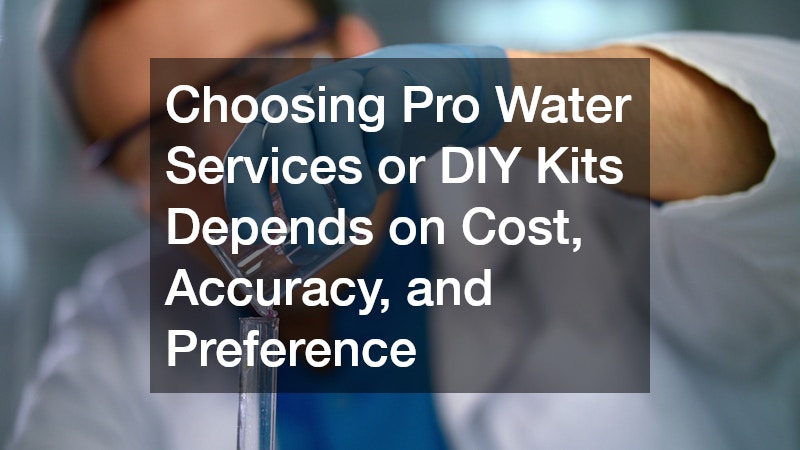Understanding the significance of water quality is crucial for health and safety. As we delve into the world of water testing, we find ourselves with two primary options: professional services or DIY testing kits. Each has its merits and drawbacks, so it’s essential to understand them to make an informed decision. This article will explore the key queries many have about these testing methods.
Why Choose a Professional Water Quality Service?
Benefits of Professional Testing
Professional water quality services are renowned for their reliability and accuracy, offering a high level of precision that DIY kits often cannot match. They are performed by experts who understand complex water quality parameters, ensuring a comprehensive analysis.
Another benefit is the detailed reports these services provide, outlining each aspect of your water’s quality with actionable insights. For homeowners and businesses looking to ensure the safety and integrity of their water supply, these reports can prove invaluable.
Moreover, professional services often use state-of-the-art technology and methodologies, resulting in precise and reliable results. This degree of thoroughness is particularly beneficial for those who depend on consistent water quality, such as restaurants and medical facilities.
Potential Limitations of Professional Services
Despite the many advantages of professional services, there are some drawbacks that consumers should consider. High costs are often a significant factor, potentially making it a less attractive option for budget-conscious individuals or smaller establishments.
In addition to the expense, such services usually require scheduling an appointment, which might not align with the immediate needs of some users. This could lead to delays in obtaining necessary water quality information, which can be impractical in urgent situations.
Moreover, depending on your geographical location, access to a reliable water testing professional may be limited. In rural areas, for example, available services could be few and far between, further complicating timely testing.
Is DIY Water Testing Effective?
Advantages of DIY Testing
DIY water testing kits offer an accessible option for individuals interested in quickly checking their water quality without needing professional intervention. These kits can be purchased easily and used at a moment’s notice, providing convenience and speed.
Cost efficiency is a notable advantage of DIY kits; they offer a budget-friendly alternative for those looking to perform regular checks without a substantial financial outlay. Many kits are user-friendly, allowing people to comfortably interpret results without specialized knowledge.
Moreover, DIY tests empower users by providing them autonomy over when and how they check their water quality. The flexibility afforded by these kits allows individuals to monitor their supply consistently, without waiting for professional availability.
Drawbacks of DIY Water Testing Kits
However, DIY water testing kits come with certain drawbacks that users should be wary of. One of the primary concerns is the accuracy of these kits; they may not match the precision provided by professional testing, leading to potential misinterpretation of results.
User error is another significant factor that can compromise the validity of DIY test results. Without thorough knowledge or experience, individuals may misapply test components, resulting in false or inconclusive readings.
Moreover, while DIY kits can identify some common contaminants, they may not detect specific or emerging threats that professional testing could uncover. This limitation is particularly pressing for those in areas prone to unique water quality challenges.
How Do I Decide Between DIY and Professional Testing?
Factors to Consider
When choosing between DIY and professional water testing, several factors should be considered, starting with the budget. For regular, affordable checks, DIY kits may suffice, but for comprehensive analysis, a professional service might be worth the investment.
The required level of accuracy is another critical consideration. If high precision is necessary, especially for detecting specific pathogens or chemicals, professional testing is generally more reliable.
Additionally, consider the specific tests needed; some contaminants might require specialized testing available only through professional services. Being informed about these needs ensures proper water quality management tailored to your situation.
When to Use Both Methods
In certain circumstances, combining both DIY and professional testing can provide a robust approach to monitoring water quality. Initial DIY tests offer a quick assessment and can be a preliminary screening tool for detecting potential issues.
If DIY tests indicate a problem or need further investigation, a professional service can step in to verify and provide a more detailed analysis. This dual approach helps mitigate risks by blending accessibility with expertise.
This strategy is especially useful for high-risk scenarios or when consistent monitoring is required; it balances the need for frequent checks with the comprehensive prowess of professional verification. Utilizing both methods ensures a thorough oversight of water quality.
The choice between professional water quality services and DIY testing kits depends on various factors, including cost, accuracy, and personal preference. By understanding the pros and cons of each method, you can ensure that your water quality testing approach aligns with your specific needs, ensuring safe and healthy water consumption.



